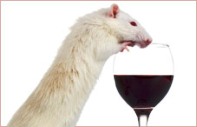 If you didn’t get that pleasant buzz with your favorite glass of wine, would your still enjoy the wine as much? Would you drink at all? Or would guaranteed sobriety be a gift, allowing you to enjoy more wines without intoxication and hangovers from overindulgence?
If you didn’t get that pleasant buzz with your favorite glass of wine, would your still enjoy the wine as much? Would you drink at all? Or would guaranteed sobriety be a gift, allowing you to enjoy more wines without intoxication and hangovers from overindulgence?
A “sobriety pill” may be on the way according to an article in New Scientist (Read Here). Researchers believe extracts from a Chinese variety of the oriental raisin tree could be the answer. Chinese drinkers have used the extract for over 500 years to reduce the effects of hangovers.
Researchers have found that dihydromyricetin (DHM), a component of the extract, works as an intoxication blocker in rats by keeping alcohol from having its normal effects on the brain. Soon DHM will be tested on humans. “I would give it to problem drinkers who can’t resist going to the pub and drinking,” says pharmacologist Jing Liang of the University of California, Los Angeles, who led the research team.
“DHM will reduce the degree of drunkenness for the amount of alcohol drunk and will definitely reduce the hangover symptoms,” says Liang. “In time, it will reduce their desire for alcohol.”
During the experiments, rats were injected with enough alcohol to simulate the human consumption of 15-20 beers in two hours and placed in a V-shaped cradle. On average, it took the drunken rats 70 minutes to right themselves. Rats who were also given DHM recovered in 5 minutes. Rats that were given DHM also behaved normally when placed in a maze, by exploring the corridors. The rats that were not given DHM cowered in the corners.
15-20 beers in two hours and placed in a V-shaped cradle. On average, it took the drunken rats 70 minutes to right themselves. Rats who were also given DHM recovered in 5 minutes. Rats that were given DHM also behaved normally when placed in a maze, by exploring the corridors. The rats that were not given DHM cowered in the corners.
DHM also appears to reduce alcohol cravings in rats that had been conditioned to drink regularly. When rats are given sweetened water with booze they normally get addicted wanting more and more. After seven weeks of DHM the “boozer” rats dropped their consumption down to a moderate rate.
Researcher Liang believes DHM works by stopping alcohol from accessing a neurotransmitter called gamma aminobutyric acid (GABA). “This supports other data that GABA receptors are key in the actions of alcohol and that targeting this interaction is a viable approach to reducing alcohol intake,” says David Nutt of Imperial College London, former head of the British government’s advisory committee on drugs. “Let’s hope it’s safe to use in humans.”
Mental health experts are divided on the benefits of a “sobriety pill,” concerned that it may lead to greater instances of alcohol abuse. A similar compound was tested by Roche but caused serious side effects. So far it does not appear that DHM has similar side effects, according to Liang.